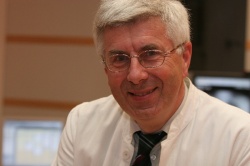Team unification and good timing to improve hospital processes
Hospitals are complex systems and optimising processes in such systems is a truly challenging task.


However, according to Professor Hans-Peter Busch, Director of the Department of Radiology, Ultrasound and Nuclear Medicine at the Barmherzige Brüder hospital in Trier, Germany, it can be done. The author of a number of books on hospital management and process optimisation in healthcare, Professor H-P Busch advises: ‘In my experience, optimisation does not begin with inviting a consultant or forming a committee. Rather, it begins by creating an atmosphere that makes change possible.’ This, he emphasises, not only includes management but also all members of staff. ‘First of all, what you need is a clear idea why change is necessary. People also need to understand what is in it for them. Communication, face time with the staff, is crucial.’ The past and present of hospital structures are dominated by the paradigm of optimised individual treatments and services; financial incentives are skewed that way, too. According the professor, all proposals for optimisation will be unsuccessful if staff and management don’t learn to think and act in terms of overall processes. ‘What we need are new incentives, new ways to motivate,’ he insists. The success of the overall treatment process needs to become the focus, not individual performance and treatment.
A comprehensive strategy
Ideally, this discussion should start while the hospital is doing well, because it can take up two years until new, optimised processes really take hold and start showing an effect. When the hospital is already losing money it becomes a lot more difficult because optimisation in many cases means investment, too. A forwardlooking answer for modern hospitals changing conditions, for example the introduction of fixed compensation (DRG), lies in a process- oriented realignment of structures and organisation forms. Based on the previous improvement of individual treatment steps, the optimisation of the overall treatment and value chain along the DRG is required. In the past, a process was considered optimised if individual steps were optimised. In the future, the quality of partial processes will be determined through their contribution to the overall result. It is very important to plant and implement process optimisation steps as part of a strategic whole. Instead, things are often done piecemeal and in response to a pressing need. What is necessary is a comprehensive concept where every individual measure constitutes an important part of the puzzle. In many cases what we see are quick fixes for urgent problems. From a bird’s eye perspective, hospitals suffer from a problem that most organisations know all too well: the difficult balance of dividing the management’s energy and attention between operative and strategic tasks.
Measure and optimise
The lack of time and resources often leads to situations where a committee is created; the committee comes up with an ambitious plan on how to improve things and sees its mission as accomplished. Everybody pital is an organisation of experts – and experts, Dr Schwarz points out, need room – space in which to move, act and decide. Many managers with a business training, he concedes though, tend to set tight rules. In an organisation of experts, he is convinced this is not the adequate mode of operation. An MBA, he underlines, does not necessarily mean a good manager. On the other hand, physicians who become managers have to develop an understanding of the overarching relationships and necessities in a hospital. They need to learn to look at medicine not from a demand point of view but from a resource angle. ‘A hospital manager has to weigh the interests of the individual patient and of all patients and the interest of the enterprise respectively,’ he says. There are indeed, he adds, examples of physicians who did not manage this change of perspective and are thus not good managers. Because hospital physicians are basically forced to assume management tasks, offering them the chance to acquire the necessary qualifications is of paramount importance – and those qualifications refer less to business issues than to personal and personnel development and returns to his or her regular job and the ambitious plan is forgotten the day after. ‘What is lacking is a systematic approach to monitoring and controlling,’ the professor points out.
Monitoring and controlling don’t come for free, the hospital needs to devote resources and manpower to make sure it happens. Process excellence costs money and many hospitals are reluctant to include those costs in their already strained budgets. One of the key areas of investment is the IT infrastructure. ‘What you can’t measure, you can’t optimise. Insufficient or faulty IT equipment in the hospital can be a problem,’ Prof. Busch explains. Another crucial component he mentions is an element of top down control: process optimisation, monitoring and controlling needs to become a priority for top-management. ‘In hospitals, that often means a different role profile for executive positions, like Medical Director and Head Physician,’ he explains. ‘Traditionally, there has been strong emphasis on medical qualifications alone and often a financial incentive to have the Head Physician treat as many private patients as possible, for example.’ Top medical executives in hospitals need to shift and broaden their scope; they need to realise that optimised processes and good management can also add important contributions to medical excellence
13.09.2012





